|
Play List: 4. Corinne 7. The Mormons 9. Lucy Brandon 10. Storm-Beaten 11. Lady Clare 13. Bachelors 14. Constance 15. Lottie 16. Agnes 17. Alone in London 18. Sophia 19. Fascination 20. The Blue Bells of Scotland 21. Partners 24. Angelina! 25. The Old Home 26. A Man’s Shadow 27. Theodora 29. Clarissa 30. Miss Tomboy 32. Sweet Nancy 33. The English Rose 36. Marmion 37. The Gifted Lady 38. The Trumpet Call 39. Squire Kate 40. The White Rose 42. The Black Domino 44. The Charlatan 45. Dick Sheridan 47. Lady Gladys 48. The Strange Adventures of Miss Brown 49. The Romance of the Shopwalker 52. Two Little Maids from School ___ |
|
ROBERT WILLIAMS BUCHANAN (1841 - 1901) |
|
|
|
|
|
|
|
|
THEATRE REVIEWS 48. The Strange Adventures of Miss Brown (1895) - continued (ii)
Otago Daily Times (New Zealand) (7 March, 1898 - p.3) PRINCESS THEATRE “THE STRANGE ADVENTURES OF MISS BROWN.” Mr Frank Thornton, whose visits are always welcomed by patrons of the theatre in Dunedin, opened a short season with his English Comedy Company in the Princess Theatre on Saturday night. The popular actor has long been held in high esteem by the theatre-going public of this city, whose memories revert fondly to his impersonation of the principal part in many well-known plays, so that for the sake of reviving old friendships as well as for forming new ones his numerous admirers do not forsake him whenever he comes to Dunedin. In addition to this, Mr Thornton is a man upon whom we may depend to bring with him a talented company. On this occasion, then, it was not surprising to find that the combination with which he has associated himself for this trip is an excellent one in every respect—it is, in fact, the company which has been playing throughout Australia with him for a year or more. As for the plays Mr Thornton presents to us, his good record of the past speaks for itself. The one in which he opened his season on Saturday is entitled “The Strange Adventures of Miss Brown.” It is a cleverly written farcical comedy in three acts, which when first introduced to Australians about a year ago was received with unmixed delight, as was proved by the fact that in both Sydney and Melbourne it had considerable runs—in Melbourne it packed the theatre for eight weeks. It certainly deserved its success, and the sympathies of the theatre-going people in Dunedin warrant the belief that it will meet with a hearty reception during the remainder of its short run in our city. The piece is by Robert Buchanan and Miss Harriet Jay (“Charles Marlowe”). The latter is an authoress who has assisted Mr Buchanan in several of his dramas, and it is said that it is owing in no small measure to her ability as a playwright that the joint productions meet with the success which they do, and which they undoubtedly merit. In “The Strange Adventures of Miss Brown” a neat little plot is evolved, which may be told in a few sentences. Miss Angela Brightwell is a ward in chancery. While still at a boarding school she is secretly married to Captain Courtney, of the 4th Lancers. On the wedding day the lady principal of the school unexpectedly makes her appearance among the small party assembled for the occasion, and insists on Angela’s return to the academy, and on the advice of a friend (Mrs O’Gallagher) the girl consents to go back. Her husband, however, finds himself in an awkward fix. Having married a ward in chancery without the sanction of the court he has broken the law, and an officer from Scotland Yard is sent after him. But Mrs O’Gallagher again proves a resourceful friend, and she contrives that while the police officer is being detained in the dining-room the gallant captain is changing his dress in an adjoining room, and presently he appears as “my niece, Miss Brown.” It is after that that the fun begins. With the view of carrying off his captive bride from the school “Miss Brown” enters the institution as a boarding pupil, and the ludicrous and the singular situations in which the intruder is placed can be better imagined than described; indeed, the handbills are not far from the mark when they inform us that “it is funny enough to drive the blues out of a bag of indigo.” Passing over these events, then, Courtney, in his new role, meets Angela and tells her his plan, with which she, of course, agrees, and they subsequently make their escape from the school. This scene is also brimful of mirth—there is plenty of scope in it for comical passages, and they are fully taken advantage of—but it is unnecessary to follow the pair in their fortunes and their trials. In the end all finishes up well. Courtney comes in for a title, and through the agency of his purse he placates the detective, while his word is sufficient for the lady principal that “the scandal” will not become public property. From first to last the play moved with a briskness that kept up the spirit of the fun throughout. It is not too much to say that the laughter was the heartiest that has been heard within the walls of the theatre for many a day, and at the end of each act the curtain was raised in response to the most enthusiastic demands. Mr Thornton, the cordiality of whose reception marked his popularity, took the part in the first act of Captain Courtney, an army officer, and later on he appeared as “Miss Brown.” He was, of course, the prime cause of the hilarity of the evening. “Miss Brown’s” demeanour on entering the academy, particularly her style of bowing to the principal and her man-like strides about the floor, were provocative of the greatest merriment, which the audience could not possibly restrain. Another most amusing scene was the one in which “Miss Brown” innocently regarding the detective’s flask, remarks that she “has heard of brandy,” and on being allowed to taste the contents drains the bottle to the dregs. Mr George Carey, the detective, who has the task of working up the case, gave the audience a distinct treat. He brought out well the officer’s high opinion of his own worth, and his return from the chase after “Miss Brown,” with a black eye and his clothes all torn, his coat being almost in two parts, quite convulsed the audience. Mr A. Cochrane deserves praise for the exceptionally good portrayal he gave of the part of the German professor of music, whom “Miss Brown” nearly throttled when he attempted to stop the runaways from leaving the school. As Major O’Gallagher, Mr Fred Shepherd was au fait with the business of his rôle, and his rich brogue and dry humour told admirably. Miss Clare Manifield, in the rôle of Angela Brightwell, played gracefully, in appropriate girlish fashion, ably seconding Mr Thornton’s efforts in several scenes; Miss Meta Pelham carried out the part of the romantic Irish lady, Mrs O’Gallagher, with commendable skill; and Miss Elsie Carew, as Miss Romney, gave an amusing impersonation of the prim principal of the girls’ school. The rest of the cast, which was in every respect competent, included Mr E. Haygarth as the solicitor, Miss Madge Corcoran as Euphemia Schwartz “from Demerara,” and Mr W. J. Townsend as the major’s servant. The stage requisites were all that was necessary, and the orchestral music was supplied by a local combination, whose efforts met with approval. |
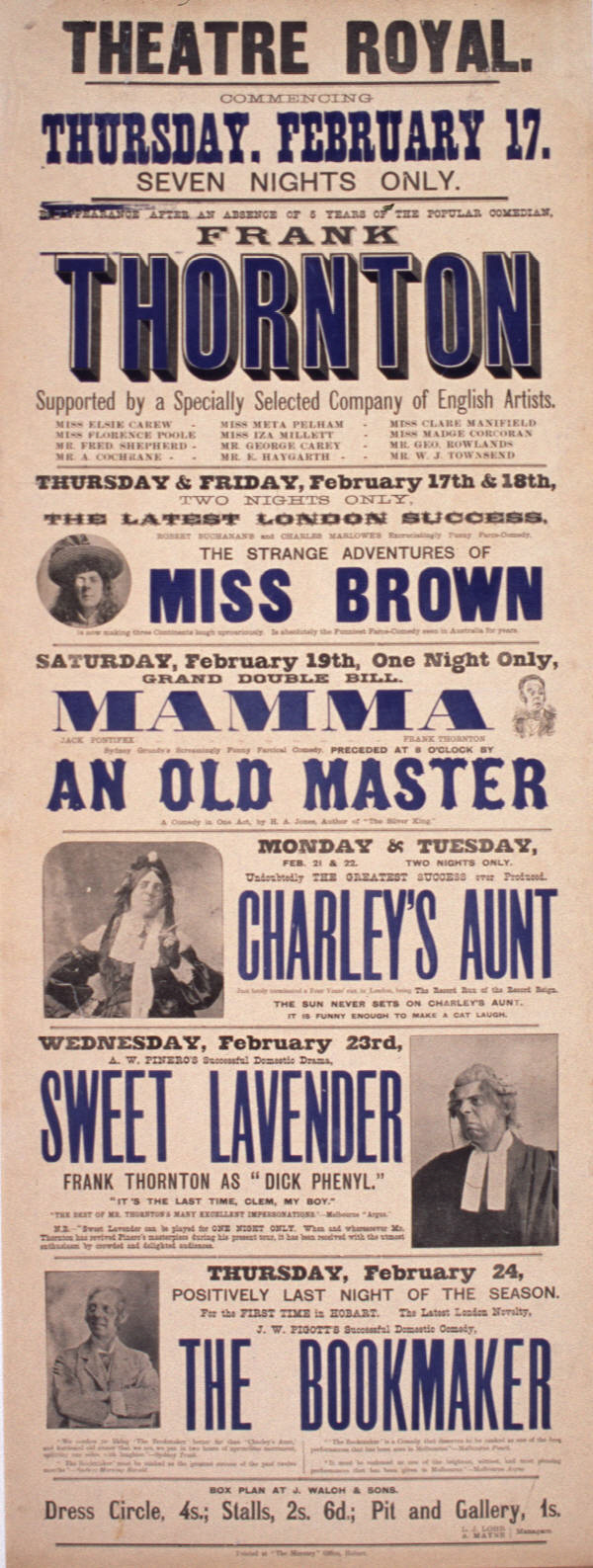 |
|||||||||
|
[1898 poster for the Theatre Royal, Hobart, Tasmania.]
Utrechts Nieuwsblad (14 February, 1899 - p.2). |
|||||||||
 |
|||||||||
|
[Click the picture for a readable version of the review (in Dutch).]
The Referee (30 July, 1899 - p.3) Now, if Elizabethan students really want a little job of work here is one for them. Next week’s programme for the good old Theatre Royal, Margate, states that “The Strange Adventures of Miss Brown” is by Robert Buchanan and Christopher Marlowe. Now, it were a delicate stratagem to unearth the date when “Kit” collaborated in this play. For my part, I should not be surprised to find that investigations would show that at the time this “Miss Brown” play was written Marlowe had three other front names—namely, Charles, Harriet, and J. ___
News of the World (22 April, 1900 - p.1) AT ST. GEORGE’S HALL. A pleasant evening’s antertainment was provided at St. George’s Hall, where the members of the Marlowe Dramatic Club gave a performance of “The Strange Adventures of Miss Brown,” a farcical comedy in three acts by Robert Buchanan and Charles Marlowe. It may be remembered that this piece was brought out some years ago at the Vaudeville Theatre, being subsequently transferred to Terry’s. Allowance being made for the non-professional nature of the representation, the piece was well carried through, those most worthy of mention being Miss Jessie Carlyon as Miss Romney, Miss Florence Rex as Angela, Mr. Murray Short as Hibbertson, and Mr. Henry E. King as Captain Courtenay. “The Strange Adventures of Miss Brown” was preceded by Charles Fawcett’s “Our Lottie,” in which Mr. Henry A. King, Miss Maud Drew, and Miss Nora Thorp showed to advantage. A crowded audience received both pieces in a hearty manner. ___
The Stage (10 May, 1900 - p.14) Mr. Frederick Kerr has written a trenchant letter to the editor of the New York Dramatic Mirror in regard to the alleged pirating of The Strange Adventures of Miss Brown in a piece known in America as The Strange Adventures of Miss Blossom, all rights of which are vested in himself. English authors should be obliged to Mr. Kerr for the stand he has taken, as it is evidently his intention to make a test case, and to that end he has placed himself in the hands of Messrs. Howe and Hummel, the well-known theatrical lawyers of New York. ___
The Globe (19 September, 1901 - p.8) PLAYS AND PLAYERS. “John Durnford, M.P.,” Stuart Ogilvie’s latest play, was performed at the Court Theatre last night for the last time. The management wisely acknowledge that the piece had “failed to attract,” and it is to be followed on Monday by “The Strange Adventures of Miss Brown.” It is a little difficult to understand how “John Durnford” came to be produced. A printed copy of it was kindly sent to the critics a day or two before production, and it must have been obvious to all who read it that the work, as it stood, could not give satisfaction. Its very length, the diffuseness of the dialogue, the plethora of details, the lack of a clear sustained interest, the weakness of the title part—all these were obvious in perusal, and were surely obvious at rehearsal. Mr. Kerr, the John Durnford, can hardly have been enamoured of his rôle, for he has never been so ill-fitted in that respect since he made his mark in London. The truth is, of course, that the defects of a play have to be discovered before the actors are engaged and the characters cast. Very rarely have managers had the courage to suppress a piece when once rehearsals have begun. “The Strange Adventures of Miss Brown,” which is from the pens of the late Mr. Robert Buchanan and Miss Harriett Jay, first saw the light at the Vaudeville on June 26, 1895, and was transferred in the following October to Terry’s, where it ran till February 8, 1896. That it was a popular success will be well remembered. Mr. Kerr figured in it as a young officer, masquerading as a “Miss Brown” at a girls’ school where his young wife (a ward in Chancery) is a pupil. Miss Palfrey was the wife, Miss M. A. Victor the schoolmistress, and Mr. Lionel Brough a policeman who provided much of the fun. At Terry’s the policeman was played by Mr. Herbert Standing, and the cast also included Miss Filippi and Miss Eva Moore. At the Court, the cats of “Miss Brown” will include—in addition to Mr. Herz, who will undertake Mr. Kerr’s original part—Mr. Victor Widdicombe as the policeman, Mr. Stanley Cooke as the music master, Miss Joan Burnett and Miss Mabel Harding as Angela and Euphemia, and Mr. John Beauchamp in his original rôle of the Major. ___
The Globe (24 September, 1901 - p.6) “THE STRANGE ADVENTURES OF MISS BROWN.” Abandoning for a short time the rather dispiriting quest after attractive novelty, the management of the Court Theatre has fallen back upon “The Strange Adventures of Miss Brown,” a three-act farce by Robert Buchanan and Charles Marlowe, which has already run the gauntlet of public opinion. First produced at the Vaudeville on the 27th June, 1895, this piece, though full of reminiscences of previous works such as “Charley’s Aunt,” obtained a frank success. When now revived it proves to have retained its power to exhilarate an audience, and though played in accentuated style was once more received with laughter and applause. Mr. Frederick Kerr no longer cares to play Captain Courtenay, the dashing young officer who, masquerading as a maiden enters, in pursuit of his amour, a girls’ school, an idea not without suggestions of Boccaccio and Lafontaine. He has found, however, a satisfactory substitute in Mr. R. C. Herz, a young actor coming rapidly to the front, who plays the character with much spirit. Mr. Beauchamp is fortunately available to repeat his fine presentation of Major O’Gallagher, Mr. Victor Widdicombe is now Sergeant Tanner, Mr. H. Nye Chart Mr. Hibbertson the solicitor, and Miss Maryon Griffiths the schoolmistress. The bevy of schoolgirls has for leaders Miss Joan Burnett, who plays with remarkable prettiness, and Miss Mabel Harding. The performance is prefaced by Mr. Robert Ganthony’s humorous entertainment. ___
The Times (24 September, 1901 - p.4) COURT THEATRE. It would be expounding the obvious to give the reasons why actors in petticoats are generally felt to be a nuisance on the stage. The point presented itself only the other day in connexion with a farce now running at the Shaftesbury Theatre. But there are exceptional cases wherein an atmosphere of frank schoolboy fun deodorizes the dangerous subject. Thus there was not a particle of offence in Charley’s Aunt; nor is there a particle in The Strange Adventures of Miss Brown. This farce, written by the late Mr. Robert Buchanan in collaboration with “Charles Marlowe,” was produced at the Vaudeville some half-dozen years ago, had, if we remember rightly, a successful career, and has now been revived at the Court. It is a very slight and unpretentious trifle, which presumably owes its reappearance to the circumstance that the Court managers are in need of a stopgap, and that one of them, Mr. Frederick Kerr, remembers that he once played “Miss Brown” himself. But that was in his salad days, and now he is content to resign the part of the cavalry captain masquerading as a schoolgirl to that versatile young actor Mr. R. C. Hertz, who will, we are sure, be found sufficiently amusing in it by those playgoers whom such things amuse at all. Miss Joan Burnett, who will be remembered for her charming sketch of the little Scotch lassie in The Wedding Guest, plays the gallant captain’s schoolgirl sweetheart; Miss Mabel Hardinge succeeds Miss Esmé Beringer as the passionate young lady from Demerara; and Mr. John Beauchamp resumes his old part of Major O’Gallagher. We give these details pro memoria rather than for their intrinsic importance. The one important point is, as we have said, that the farce is wholly inoffensive; and it was greeted with hearty laughter last night. ___
The Echo (24 September, 1901) “THE STRANGE ADVENTURES Without Mr. Kerr at the Court Theatre. In place of “John Durnford, M.P.,” his miserable love affair and his tedious politics, comes “Miss Brown” and her “strange adventures,” presumably as a make-shift till Messrs. H. T. Brickwell and Frederick Kerr can find a new play for their Court Theatre enterprise. Six years ago Robert Buchanan and “Charles Marlowe’s” naive farce (obviously suggested by “Charley’s Aunt”)—a record it may be remembered of the experiences of a young officer who married stealthily a ward in Chancery and then, to dodge the police, obtained in feminine guise admission to his school-girl wife’s educational academy— WON DELIGHTED LAUGHTER from unsophisticated playgoers last night on its revival. The play, which has lost none of its broad and extravagant humours, seemed also to have retained its power of amusing popular and, happily, thoughtless tastes. “Miss Brown” may touch rather closely the skirts of impropriety, but after all she affords tolerably innocent diversion. What matters it that Mr. Herz, who now succeeds Mr. Frederick Kerr as the masquerading “Miss Brown,” takes no more trouble than other female impersonators to suggest the voice or THE MANNER OF A WOMAN? Over emphasis of awkwardness, constant betrayals of sex, such things, especially if displayed when the impostor is surrounded by a chorus of girls, have a special piquancy for the giggling shop-girl, and even the vacuous man about town. By contrast with this purely theatrical tour de force, Mr. Beauchamp’s and Mr. Widdicombe’s more plausible sketches of the good-natured Irish major, and the gulled detective, and again Miss Joan Burnett’s decisively natural rendering of the school-girl heroine, appear quite commonplace in their artistic restraint. ___
The Illustrated London News (28 September, 1901 - p.2) “MISS BROWN,” REVIVED AT THE COURT. At the Court is revived a farce written by Robert Buchanan and Charles Marlowe, and entitled “The Strange Adventures of Miss Brown.” It is a farce replete with the time-honoured humours that follow a necessity on the attempt made by a cavalry officer who has married a ward of Chancery to escape the penalties of his position by passing himself off as a giggling schoolgirl. There is nothing to be said of the piece save that it falls in with the prevailing stage fashion—witness the success of “Charley’s Aunt” and of “Are You a Mason?”; that its heroine is very brightly and naturally played by Miss Joan Burnett; and that Mr. R. C. Herz, who follows Mr. Fred Kerr in the rôle of the masquerading officer, makes not the slightest attempt to suggest femininity either in speech or gait. ___
The Illustrated Sporting and Dramatic News (28 September, 1901 - p.24) John Durnford, M.P., having failed to please his constituents or to give anything like satisfaction to the parliament of playgoers, was summarily dismissed from Court—we should say “the Court”—and on Monday the boards were devoted to a revival of The Strange Adventures of Miss Brown, the amusing comedy by poor Robert Buchanan and “Charles Marlowe,” which had its original production some six years ago at the vaudeville, from which house it was subsequently transferred to Terry’s Theatre. In this piece it will be remembered a certain Captain Courtenay, when he has carried off a boarding school miss—one Angela Brightwell—puts on petticoats in order to elude the officers of the law who went to lay hands on him by order of the Lord Chancellor for marrying one of his wards without consent. The scheme is somewhat risky, but there is no offence in it against good taste, and much fun comes of it. Mr. Fred Kerr, the original representative of Courtenay, has at the Court handed the part over to Mr. R. C. Herz, who plays it only fairly well. Mr. J. Beauchamp repeats his clever impersonation of Major O’Gallagher, the captain’s best friend. The part of Sergeant Tanner, originally filled by Mr. Lionel Brough, is now divertingly taken by Mr. Victor Widdicombe, and that of Courtenay’s rival, Herr Von Moser, the music master, is well handled by Mr. Stanley Cooke. Miss Joan Burnett makes a charming representative of Angela Brightwell; Miss Marjorie Griffiths does well as Miss Romney, of Cicero House Academy, and other characters are ably rendered by Messrs. Paul Vincent and H. Nye Chart, and the Misses Mabel Hardinge and Kate Harwood. ___
Lloyd’s Weekly Newspaper (29 September, 1901 - p.8) Public Amusements. COURT THEATRE. Messrs. Brickwell and Kerr’s revival of that diverting farce, The Strange Adventures of Miss Brown, is excellently timed. There are none too many really funny, and withal perfectly harmless, pieces before the public at present, and the interpretation is as British in spirit as it is in letter. The lengthy run the farce enjoyed six years ago did not take the edge off the series of extravagant situations springing from a schoolgirl, a ward in Chancery, marrying a military swain, and from that swain adopting feminine attire while completing arrangements for removing his young bride from the jealous guardianship of the schoolmistress. The manifold comic details which the late Mr. Robert Buchanan and “Charles Marlowe” embroidered on the main theme still come out sharply and with strength. The confusion of the masquerading Captain Courtenay when the fair pupils of Cicero House Academy gather round and quiz the appearance of the new comer, is illustrated in exactly the right way by Mr. R. C. Herz, who displays much tact in avoiding pitfalls. He acts with animation and humour, but refrains from excess. The stupid police-sergeant who plumes himself upon exceptional astuteness has a very droll representative in Mr. Victor Widdicombe, and Miss Marjorie Griffiths is sufficiently acrid as the schoolmistress. Miss Joan Burnett is alert and piquant as the defiant little heroine. The sentimental schoolgirl with a cold in her head is well played by Miss Kate Harwood, and Mr. John Beauchamp is quite at ease as the excitable but friendly major. From start to finish the performance is irresistibly laughable. Next week the farce will be preceded by Mr. Robert Ganthony’s mirthful recitals, Colby and Way’s ventriloquial and dancing doll act, and by Mdlle. Eugenie Pougčre, the vocalist. ___
The People (29 September, 1901 - p.6) THE STAGE. COURT. At the pretty playhouse of chequered fortunes in Sloane-square, Messrs. Kerr and Brickwell have revived the three-act farce entitled, “The Strange Adventures of Miss Brown,” in which, it will be remembered, Mr. Kerr on the first production of the piece personated its most prominent character, that of a young cavalry captain of frolicsome disposition, who, to further his amatory purposes, assumes female habiliments for the purpose of gaining admission as teacher to the academy for young ladies in which his sweetheart is a pupil. Half a century before the late Robert Buchanan and the lady calling herself Charles Marlowe collaborated in the making of the farce, an English version derived from the same French source, entitled “The Boarding School,” used to be played as a stock piece at the Haymarket. Now, as then, its fun depends, like “Charley’s Aunt,” upon the ludicrous embarrassments and equivocal misunderstandings consequent upon the innocent disguise of sex. Mr. Kerr who was wont in the part to evoke peals of laughter, as the pretended “new girl,” has now turned over the part on its revival to one of the cleverest among our rising comedians, Mr. R. C. Herz, whose bright and lively portrayal of the masquerading captain finds responsive vivacity and sprightliness in Miss Joan Burnett as his youthful lady-love. The services of Mr. John Beauchamp are fortunately available for the part of Major O’Gallagher, originally played by him, and otherwise the company of the Court furnishes an efficient cast, securing for the revival an hilarious reception. ___
The Tatler (9 October, 1901 - p.20) [Note: The Tatler printed the following feature on the revival of The Strange Adventure of Miss Brown at the Court Theatre.] |
|||||||||
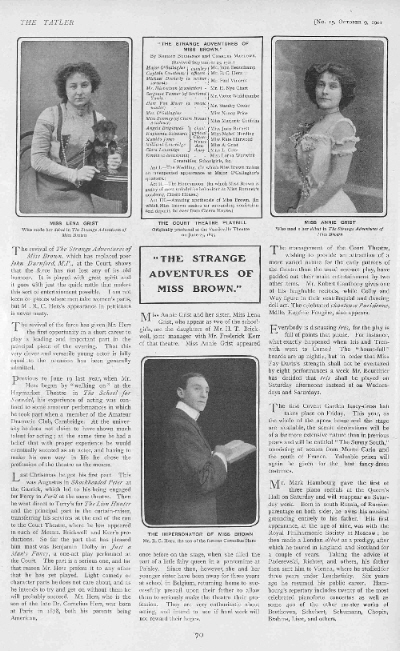 |
|||||||||
|
Cass City Chronicle (Michigan) (15 June, 1906) |
|||||||||
 |
|||||||||
|
The Hastings and St. Leonards Observer (30 March, 1907 - p.4) “THE STRANGE ADVENTURES OF MISS BROWN” ON HASTINGS PIER. One of the best Companies of comedians we have seen at Hastings Pier for some time is taking part in “The Strange Adventures of Miss Brown,” the well known farcical comedy by Robert Buchanan and Charles Marlowe, which is the fare this week, and which is exciting hearty laughter. ___
The Taunton Courier (2 September, 1908 - p.4) “THE STRANGE ADVENTURES OF MISS BROWN,”—The amusing farcical comedy, the part author of which (in collaboration with the late Robert Buchanan) is Charles Marlowe, at present familiar to theatre-goers as the writer of “When Knights were Bold,” is announced by advertisement in another column to visit the London Assembly-rooms on Thursday (to-morrow) and Friday, September 3rd and 4th. “Miss Brown” attained a long run a few years ago in London, first at Terry’s Theatre and subsequently at The Court Theatre, and was at the time considered the most successful and humorous play then running. Miss Brown is the name assumed by a young Army officer, who, by donning feminine attire, gains admittance as a pupil to a young ladies’ school. Many extremely funny situations occur, and the dialogue is of that crisp and sparkling variety which so distinguishes Charles Marlowe’s latest work. The play will be presented by a well-organised and capable company.—Seats may be booked and reserved at Mr. F. W. Baker’s music warehouse, Fore-street. ___
[I came across this programme (dated 11th March, 1911) on the Brooklyn Academy of Music site. It’s for a performance of The Strange Adventures of Miss Brown, with an all-male cast, at the Polytechnic Institute of Brooklyn, New York. |
|||||||||
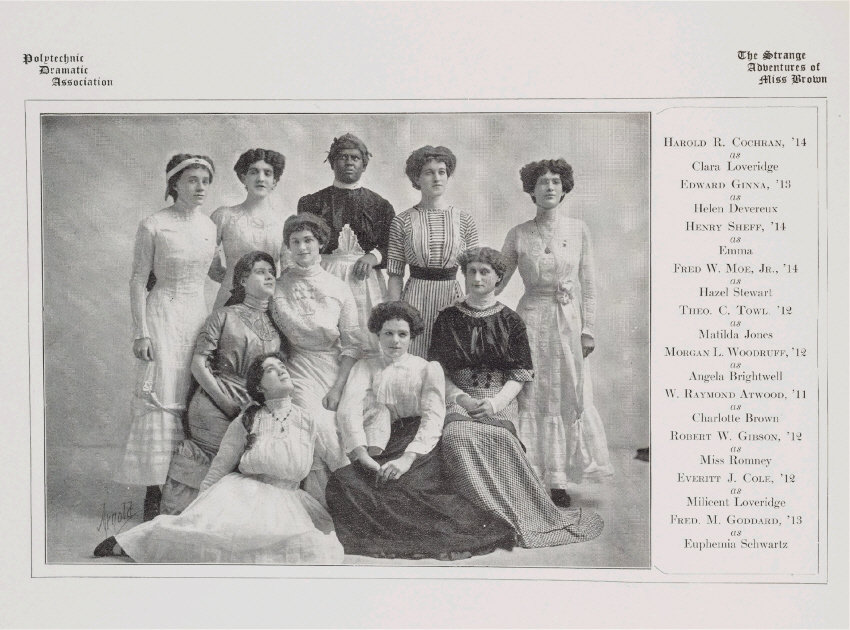 |
|
The Sun (New York) (18 May, 1919 - p.8) The theatre ideas which are destined to survive throughout a long period never seem so striking when they are divulged for the first time. It is not possible to say—unless this superior power of divination may be possessed by some of the elect—that this story or this theme is destined to uncommon longevity. Take for instance “The Strange Adventures of Miss Brown.” When that farce was seen here some thirty years ago the excitement was not uncontrollable. Robert Buchanan had written the play for his sister-in-law, Harriet Jay, although he probably was not altogether unmindful of the popularity of “Charley’s Aunt.” In London the success of the play was greater than it has ever been here. |
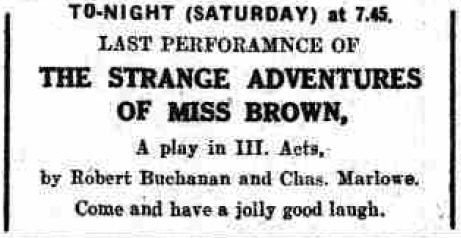 |
|
[Advert for the St. Leonards Palace Pier from The Hastings and St. Leonards Observer
The Stage (17 September, 1925 - p.4) MANCHESTER. OSBORNE (P., W. H. Broadhead and Son; A.M., Robt. Sharples; Mus. D., Jos. Hartley).—The resident stock company are this week presenting “The Strange Adventures of Miss Brown.” Major O’Gallagher has a soldierly exponent in Atholl Douglas. Harry J. Clifford invests the rôle of Capt. Courtenay with a military air. Ethel Bracewell scores as Angela Brightwell. Matilda Jones is smartly played by Violet Ingram. Miss Romney has a successful representative in Madge Trevelyan. Good support comes from the remaining members of the cast. ___
Gloucester Journal (9 July, 1927 - p.14) Gloucester Amusements. THE HIPPODROME. Next week, “The Strange Adventures of Miss Brown,” by Robert Buchanan and Charles Marlowe (with apologies to Sir Arthur Conan Doyle), will be presented by The Denville Players at the Hippodrome. This comedy is considered by many people as funnier than “Charley’s Aunt.” It deals with Capt. Charles Courtney (Len Lauri), who marries by stealth Angela Brightwell (Marjorie Denville), a ward in Chancery. Miss Flora McDowell, Miss Helen Tait, Miss Barbara Overthrow, Miss Grace Partridge, and other local ladies will appear in the cast. ___
The Stage (22 March, 1928 - p.25) FLEETWOOD—PALACE.—A large audience thoroughly enjoyed the humour of “The Strange Adventures of Miss Brown,” presented by Harry Clifford’s Repertory Players on Monday. Mr. Clifford, as the Cavalry Officer who resorts to female impersonation, caused roars of laughter, and other parts were well sustained by Bartlett Garth, Gypsy Alexander, Fred Granville, Douglas Ives, Kathleen Saintsbury, and Fred Granville. ___
In 1935 a musical adaptation of The Strange Adventures of Miss Brown was produced in London’s West End. Further details, including the programme, are available below: |
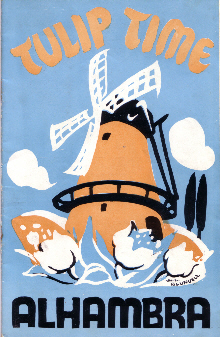 |
|
The Derby Daily Telegraph (12 May, 1938 - p.4) ‘ADVENTURES OF MISS BROWN’ FARCICAL COMEDY AT DERBY St. Augustine’s Church Amateur Dramatic Society gave their first full-length production at the Sons of Temperance Hall, Derby, last night. TO HELP CHURCH FUNDS Other parts were taken by Reg Allsopp, Ron Schofield, Minnie Handley, Reg Moore, Ken Bradley, Beryl Angreve, Hilda Hobby, Winnie Randall, and Lucy Hanshaw. ___
The Stage (26 June, 1952 - p.10) WEBBER-DOUGLAS STUDENTS FARCE AND BYRON It must be a headache to those responsible for the organising of student shows to select a play or series of short plays or sketches which will condense into three short hours the syllabus of years of concentrated training. ___
The Stage (23 October, 1958 - p.17) Christmas Musical ___
The Stage (1 January, 1959 - p.12) ‘THE AMAZING ADVENTURES FOR the second year in succession, Miss Peggy Ann Wood has set a Victorian play to music of the period for the Rapier Players’ Christmas production at the Little. [Note: The full cast list from the production is available on the Theatricalia site. It includes that ill-fated starlet from the 60s and 70s, Imogen Hassall.] _____
Next: The Romance of the Shopwalker (1896) Back to the Bibliography, Plays, Harriett Jay Theatre Reviews or Buchanan’s Music
|
|
|
|
|
|
|